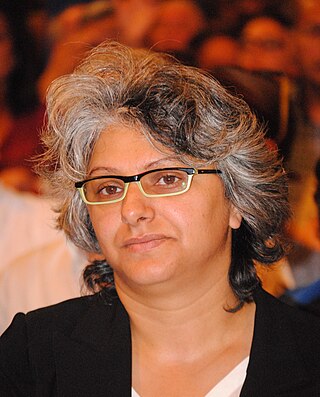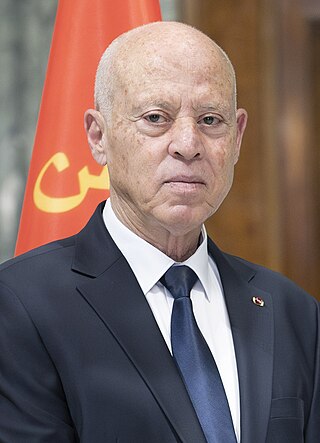
The Tunisian Football Federation is the governing body of football in Tunisia. It established in 1957. It became a member in the FIFA in 1960, and in the same year it also became a member of CAF association. It organises the football league, the Tunisian Ligue Professionnelle 1, the Tunisia national football team and the Tunisia women's national football team. It is based in Tunis.
The Constitution of Tunisia is the supreme law of the Tunisian Republic. The constitution is the framework for the organization of the Tunisian government and for the relationship of the federal government with the governorates, citizens, and all people within Tunisia. Tunisia's first modern constitution was the Fundamental Pact of 1857. This was followed by the Constitution of 1861, which was not replaced until after the departure of French administrators in 1956, by the constitution of 1959. It was adopted on 1 June 1959 and amended in 1999 and 2002, after the Tunisian constitutional referendum of 2002.

The Free Destourian Party, until August 2016 known as the Destourian Movement, is a Tunisian political party founded by former members of Tunisia's pre-revolution ruling party, the Constitutional Democratic Rally. In the 2014 presidential election, the Destourian Movement presented Abderrahim Zouari, Minister of Transport from 2004 to 2011, as candidate. The party is now led by the lawyer and MP Abir Moussi. Since early 2020, the party is leading in all opinion polls for the next Tunisian general elections, and its leader Abir Moussi is always second just after incumbent president Kais Saied. On October 3, 2023, the president of the PDL, Abir Moussi, was arrested in a series of political arrests and crackdown on the opposition launched by president Kais Saied.

A constitutional referendum was held in Mali on 18 June 2023. It was initially scheduled for 9 July 2017. However, in late June 2017 it was postponed with no date set, before being revived in mid-April 2021, with a date set of 31 October 2021. Due to the 2021 Malian coup d'état it was indefinitely postponed, with plans for it to be held by 2024. It was later scheduled for 19 March 2023, but then postponed again. On 5 May 2023 the ruling junta announced in a decree that it would be held on 18 June.
The Tunisian Association of Democratic Women is a Tunisian feminist association which was founded in 1989.

Basma Khalfaoui, is a Tunisian lawyer, political activist and long-time advocate for the women's movement who rose to national prominence following the assassination of her husband Chokri Belaid in 2013.

Kais Saied is a Tunisian politician, jurist and retired professor of law currently serving as the seventh president of Tunisia since October 2019. He was president of the Tunisian Association of Constitutional Law from 1995 to 2019.
The Tunisian Association for the Support of Minorities or ATSM is a Tunisian Non-governmental organization fighting for minority rights, targeting antisemitism in particular.

Abir Moussi is a Tunisian lawyer and politician. She has been the president of the Free Destourian Party since 2016 and a member of Parliament since 2019. Abir Moussi is considered one of the most important and famous Tunisian politicians who defend the civil state and Bourguiba's approach. She is also known for her absolute rejection of political Islam movements and all forms of confusion between religion and politics. On October 3, 2023, Abir Moussi was arrested in front of the presidential palace of Carthage, in a series of political arrests and crackdown on the opposition launched by Tunisian president Kais Saied.

Chedly Ayari was a Tunisian politician, economist, and diplomat. He served in several ministerial positions under the government of Habib Bourguiba and was President of the Central Bank of Tunisia from 24 July 2012 to 16 February 2018.

Parliamentary elections were held in Tunisia on 17 December 2022 to elect the third Assembly of the Representatives of the People. Run-offs were held on 29 January 2023 in the vast majority of constituencies after only 21 candidates were elected in the first round.
Events in the year 2022 in Tunisia.

A constitutional referendum was held in Tunisia on 25 July 2022 by the Independent High Authority for Elections. The referendum was supported by the Tunisian president, Kais Saied, one year into a political crisis that began on 25 July 2021. The referendum was preceded by an electronic consultation regarding the nature of the political system and the method of voting in legislative elections. It was boycotted by many of Tunisia's largest political parties.
Sihem Boughdiri Nemsia is a Tunisian banker and politician. She has been Minister of Finance in the Bouden Cabinet in August 2021.
Ichraf Saïed, née Ichraf Chebil is a Tunisian magistrate, wife of current President Kaïs Saïed, and, therefore, the First Lady of Tunisia since 23 October 2019, following the election of her husband to the presidency of the republic. She is the ninth first lady of Tunisia and the fifth first lady of the post-Tunisian Revolution era.

A constitutional referendum was held in the Central African Republic on 30 July 2023.

Presidential elections are scheduled to be held in 2024 in Tunisia. They will be the first presidential elections since president Saied’s self-coup.

The National Council of Regions and Districts is the upper house of the Parliament of Tunisia since the promulgation of the New Constitution approved during the constitutional referendum of 25 July 2022.
The Tunisian Constitution of 1959 was promulgated on 1 June 1959. The application of the text was suspended following the Tunisian Revolution, a Constituent Assembly being elected on 23 October 2011 to draft a new text. In the meantime, a decree-law of 23 March 2011 then a constitutive law of 16 December of the same year provisionally organized the public authorities. The new Constitution was adopted on 26 January 2014.












